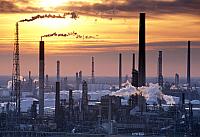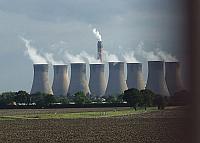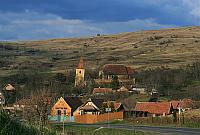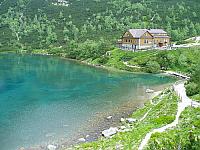 interest rate hikes and the uncertainties around the US and UK credit crunch have taken their toll. Things are not likely to improve for some time. Most people expect prices to stagnate but the doom-mongers are out in force and many people are again talking of a house price crash.
interest rate hikes and the uncertainties around the US and UK credit crunch have taken their toll. Things are not likely to improve for some time. Most people expect prices to stagnate but the doom-mongers are out in force and many people are again talking of a house price crash.In the last few years, we have been advising investors to buy in London – prices have risen 25% in the last two years and ca. 50% in the West End. But we now do not see any significant growth in 2008. There are risks of a fall in prices - so for new investors, now is not the time to buy. For established investors with much equity and cash, bargains could be available in the next few months as the market cools further.
We do not expect a crash for the following reasons:
- Shortage of supply – this is an underlying trend and it's not likely to go away with an expanding population, smaller families, more singles and people's continued aspirations to live in a home, many on their own. We believe 300,000 new homes need to be built per year to keep up with demand, with the biggest demand being in London and southern England, but only 200,000 are being built, mostly in other parts of the UK.
- Employment – unemployment has remained stable a 5.4% - barring a recession, this should protect against too many distressed households.
- Interest rates – these are likely to begin dropping either early December or more likely in January 2008. A 0.25% drop is likely in the next three months, with another 0.25% drop in mid 2008. This should ease household finances – the Bank of England cannot afford to see a wholesale house price crash – so expect them to react to house prices like they have done when prices have been rising strongly.
- Inflation – despite record oil prices close to $100/bbl, inflation (measured in CPI) has remained remarkably low. This allows room to drop interest rates.
- GDP – this is expected to slow to 2% or slightly below in 2008 and will further encourage the Bank of England to drop rates, which should in turn help support house prices.
- Sterling – the pound is likely to drop as oil prices rise and interest rates come down slightly – this should increase manufacturing competitiveness boosting exports and manufacturing jobs, but the threat is increased inflation. As long as inflation remains in control and wage inflation subdued as it currently is, Sterling will probably correct against the Euro and possibly against the Dollar though this should not unduly affect property prices.
- Immigration – record levels of inward migration is boosting the UK's population and keeping wage inflation lower than it normally would be – both these boost property prices and should help prevent a fully fledged crash.
- Tax – the flat capital gains tax change to 22% should positively impact the market and increase returns for investors.
 |  |
We expect the GDP in northern parts of the UK and the Midlands to drop to 1% whilst London will continue to motor along at about 2.5%. The lack of new public sector jobs and pressure on manufacturing will suppress property prices in these northern areas. The population is growing at a slower pace, less services jobs are available and it's easier to build new homes – so the north should feel the effects of the interest rates more than the south. This is why we were not surprised to see the recent Rightmove.co.uk report which showed London prices rising 2.3% in a month whilst all other areas saw falls of up to 2%.
 The wild card continues to be the oil prices – and as we have so often predicted, we believe it will end 2008 at $125/bbl. The big unknown is whether this will affect inflation – it seems rising from $20/bbl to $95/bbl has had no appreciable affect on longer term inflation, so we are now thinking that a rise to $125/bbl may not be a tipping point. If you are concerned about oil prices, you'd better read all our special reports on the subject.
The wild card continues to be the oil prices – and as we have so often predicted, we believe it will end 2008 at $125/bbl. The big unknown is whether this will affect inflation – it seems rising from $20/bbl to $95/bbl has had no appreciable affect on longer term inflation, so we are now thinking that a rise to $125/bbl may not be a tipping point. If you are concerned about oil prices, you'd better read all our special reports on the subject.
As a reminder, we enclose our ranked list of the best towns and cities to invest in – the top two are both exposed positively to higher oil prices:
Highest growth
- London
- Aberdeen (oil town)
- Cambridge
- Reading
- Bristol
- Brighton
- Plymouth
- Portsmouth
- Southampton
- Manchester
- Leeds
- Bradford
- Chester
- Glasgow
- Oxford
- Edinburgh
- Leicester
- Liverpool
- Derby
- Birmingham
- Middlesboro
- Hull
- Nottingham
- Newcastle
Lowest Growth
So all investors – be careful – make sure you have enough cash to weather some rough times and be on the lookout for bargains from distressed sellers. Some people simply have to move to a new location of work or move because of divorce or other problems, so do not underestimate how much reduction you could get if you are able to move quickly and have proper financing in place. For the less wealthy investors – it's probably best to hold fire for now and monitor the market. For the first time buyer – best not enter the market just at this time for fear of immediately running into negative equity.
But remember, if we'd all listened to those Chicken Little's who predicted a house price crash back in 2001, we'd have missed out on a doubling and in some casing trebling of house prices. Confidence has been shaken and prices can go in both directions, so it's up to you to judge whether you want to enter this market and seek out bargain, or sell your portfolio because you are so spooked. But the wealthiest investors normally buy on a low and hold – Warren Buffet being the classic example – of a disciplined value investor. We can try and follow his tenants. But don't expect to make serious money unless you risk at least some of your hard-earnt cash.
 |  |
Oil Prices Continue to Skyrocket
On 14 th August when oil prices were at $70 / bbl – we predicted oil prices would rise to $125 / bbl by end 2008. They almost touched $100/bbl end November before easing back to $90/bbl. We have written ten special reports on this topic – we suggest all serious property investors should read these report that have taken years of analysis and insights to prepare:
- 169: Oil supply crunch begins… protect yourself
- 168: Alarm bells ringing – oil price shock now on the horizon
- 163: Making Serious Money as asset prices plateau – resources and property
- 161: Resources winners and losers - ranked list for property investors
- 160: Find out the winners and losers in the biggest oil boom in history - about to happen...
- 159: Massive oil boom - the winners and losers - be prepared
- 158: Supply and demand scenarios - oil boom and the property investors insights
- 157: Impact of "Peak Oil" for Property Investment
- 151: Oil price $125 / bbl and rising…how to take advantage in property
- 150: Peak Oil shortly due to be reach – unique insights for a property investor
- 148: Take advantage of the oil/gas/coal boom – key insights
In these reports, you'll find, for free, all you need to know about how to make serious money from the predicted boom in oil prices. The analysis of all producing oil nations has taken years to prepare and we finally think we've cracked it. The results shows that we are now on a rolling plateau production rate, meanwhile demand is increasing by 1.3 million barrels a year. We spotted this abnormality on 7th June 2007 and we now think prices will skyrocket. The opening gaps between oil supply and oil demand is a dangerous situation. OPEC meet early December and may very well communicate they will increase supply by 0.5 million bbls oil per day. But it's too little too late. Any increase in oil supply will likely be lower value high sulphur heavy crude. When the markets finds out that the global oil producers cannot increase production any further, there will be a mother of all oil price hikes. So be prepared. And don't say we didn't warn you!
 |  |
This analysis is underpinned by our unique oil production mathematical model which forecasts every country's production up until 2015 and it does not make very pleasant reading. As already described – production is on a plateau and has been on plateau since October 2005. This is why prices are rising. But many in the market mistakenly believe there is more oil out there that can be switched on – it's not going to happen. The plateau could be long and undulating, but we believe everyone is more or less pumping at their maximum. So for the property investor:
- do not purchase property in far off places which take a tank full of gas to reach – this includes suburban homes with a very long daily commute to work centres
- be careful about purchasing holiday homes in places that need a 10 hour flight to reach (stay within 2-3 hour flight radius from major population centres)
- be careful not to purchase huge fuel inefficient homes in cold climates requiring much heating oil, gas or electric
- the lowest risk options are city central quality apartments close to services jobs
- consider purchasing property:
- in oil, coal, gas and mining boom towns (refer to the above special reports)
- close to oil company and oil services company offices
- in areas positively affected by renewable energy developments – solar, wind, hydro-electric, low energy conservation centres.
For US investors the best places to invest in the USA to take advantage of the oil boom are:
- Wyoming – Green River area for the coal boom
- Western Colorado – oil shale potential future boom area
- Texas – Houston, and Dallas-Irving-Fort Worth – oil/gas HQs and technical services centres
- New York City – oil/gas/energy trading
- Oklahoma – ethanol from corn and some old oil/gas wells
The USA has more coal than any other country in the world. So it seems clean coal technology with electricity to automobiles (electric cars) will be a key future response to dwindling oil (and gas) supplies.
As we predicted, Houston has done well in the last few years to weather any downturn in the real estate market and we expect this to continue. But be very careful not to purchase property more than a 30 minute auto commute to a city centre – when oil prices skyrocket, people will want to move into the cities to reduce their fuel bills. Outlying suburban areas will suffer. An extreme example is – don't buy a large detached suburban house 80 minutes commute to downtown Detroit. The gasoline guzzling car plants will close. No-one will be able to afford to commute or heat a huge house in the cooler north. You would be better off buying a downtown apartment in the oil capital of the USA – Houston, which will benefit from the high oil prices that in turn will destroy the gas guzzling autos.
 |  |
US Market Update
The US real estate market continues to be in a distressed and depressed position in most states. However, the market varies – the US is such a huge market – some areas are still rising but overall the situation looks fairly bleak. We believe the extent of the unraveling of the sub-prime woes is about 45% complete. In Spring 2008 we will be past the peak of the rates resetting and by September 2008 most of the resetting will have unraveled. Until then, expect a bumpy ride with continuous negative headlines and some banks getting into trouble and writing down bad debt. The problem emerged in the open in July – it's now December so quite some time has now passed.
![[Reset]](http://www.propertyinvesting.net/images/newsletter/Nov07-image021-200.gif) US homes prices have been most negatively affected in areas away from cities where prices shot up the most. Examples are holiday areas in California and Florida. But closer scrutiny of the numbers identified that cities like Miami and Detroit actually saw prices rise slightly in the last quarter. Prices in large cities like New York and Los Angeles are fairly stable. Prices in Texas have been robust and in most areas rising. Prices in remoter areas with less service industries and more manufacturing and agriculture have generally dropped back. It's difficult to generalize but it does not look like a full scale meltdown. Although
US homes prices have been most negatively affected in areas away from cities where prices shot up the most. Examples are holiday areas in California and Florida. But closer scrutiny of the numbers identified that cities like Miami and Detroit actually saw prices rise slightly in the last quarter. Prices in large cities like New York and Los Angeles are fairly stable. Prices in Texas have been robust and in most areas rising. Prices in remoter areas with less service industries and more manufacturing and agriculture have generally dropped back. It's difficult to generalize but it does not look like a full scale meltdown. Although  everyone talks about the US housing bubble and it's bursting, prices rose by a relatively modest (in global terms) 50% in five years up until early 2007. It's difficult to see how prices could crash and burn when home prices came from a low base.
everyone talks about the US housing bubble and it's bursting, prices rose by a relatively modest (in global terms) 50% in five years up until early 2007. It's difficult to see how prices could crash and burn when home prices came from a low base.
The US population has risen from 150 million in 1950 to 300 million today. The population  is projected to rise to 450 million by 2050. This implies 75 million new homes will be required. The fastest growing areas are Nevada, Arizona, Texas, California and Florida – see our special reports for more details. So in these areas where land shortages occur, it is likely prices will recover and move far higher in years to come. One can expect a period of stagnation for a few years then prices in these areas will again rise. California should also follow suit as the population in this state is also increasing and it's difficult to see where all the new homes will be build with increasing environmental restrictions coming into force. Ditto Florida. And remember the wave of aging babyboomer that will start retiring this year, peaking in 2016.
is projected to rise to 450 million by 2050. This implies 75 million new homes will be required. The fastest growing areas are Nevada, Arizona, Texas, California and Florida – see our special reports for more details. So in these areas where land shortages occur, it is likely prices will recover and move far higher in years to come. One can expect a period of stagnation for a few years then prices in these areas will again rise. California should also follow suit as the population in this state is also increasing and it's difficult to see where all the new homes will be build with increasing environmental restrictions coming into force. Ditto Florida. And remember the wave of aging babyboomer that will start retiring this year, peaking in 2016.  These people will want to move to the sand, sea, surf and cultural centres. This is why we have a long term view that coastal Florida, California and culturally interesting places like Austin in Texas and Sante Fe in Utah will continue to see prices rising after a few years.
These people will want to move to the sand, sea, surf and cultural centres. This is why we have a long term view that coastal Florida, California and culturally interesting places like Austin in Texas and Sante Fe in Utah will continue to see prices rising after a few years.
But be careful investing in oil intensive areas like Detroit and Cleveland. These cities are far too reliant on the auto-industry and the increase in oil prices will hit them hard. But Houston will prosper along with the new energy corridor of western Colorado, Wyoming and NE Utah – areas expose to coal, oil shale and coal-bed methane and closer to the Oil Sands projects of Alberta in Canada.
Property prices have risen dramatically in the last seven years as interest rates have remained low and inflationary pressures subdued. The GDP of Europe has averaged around 2% for the last few years. But Euro area asset prices are likely to come under pressure as evidenced by price drops in Ireland this year. It's late in the party and we would steer clear of faltering economic area exposed to high oil prices such as Italy, Portugal and Greece. Southern Spain and southern France will likely see prices continue to increase led by wealthy people migrating to these area and setting up businesses – populations in areas like Perpignan, Toulouse, Sete and Montpellier in France and Marbella, Malaga and Valencia in Spain are increasing - investment levels remain robust. Wealthy retiring northern European baby-boomers will also support this market.
Germany is an interesting market but it's difficult to judge whether it's best to invest in previously depressed cities like Berlin and eastern Germany where asset prices are very low priced, or areas like Munich in the wealthy south which have very high property prices. Our gut tells us, that Munich and the south is the better place because of the booming services business, pleasant climate, local wealth, central position and booming banking and high-tech businesses. But it's not an obviously a high return area and Germany has suffered in the last 15 years compared with countries like UK and Ireland because of the excessive regulation and high cost of labour. Undoubtedly a pleasant place to live, but it is difficult to see high investment returns. Yes, yields for rental property are high in northern and eastern Germany, but asset prices are unlikely to boom.
 |  |
The new European Union entrants Romania and Bulgaria remain very interesting. We expect the markets to cool in the next year, but property prices in good locations in the capital cities of these two countries should continue to boom as long as their economies continue to be managed affectively. There has been a brain drain away from Romania and Bulgaria to places like the UK and Ireland in the last few years, but eventually these people will return flush with cash and want to purchase property in the capital cities Sophia and Bucharest, as well as nice farm houses in the best areas. So we expect prices to double or more in Romania in the next ten years. One just needs to be very careful with the legal, tax side and make sure one does not get ripped off!
Bratislava – the capital of Slovakia is another gem. It's only 60 km from Vienna and cross border trade is increasing rapidly. Austrian property prices have also risen by about 10% in the last year. We expect Bratislava prices to normalize towards Vienna prices in future years. It's very central and the flat tax regime plus car plants on Slovakia have helped the economy enormously – worth checking out for all those exploratory investors in Europe. Another interesting option is ski villas in the High Tratras mountain – a booming ski centre – though one needs to research the affects of global warming since the snow might become rare in future years. But still a beautiful scenic area for holidays years round.
 |  |


No comments:
Post a Comment